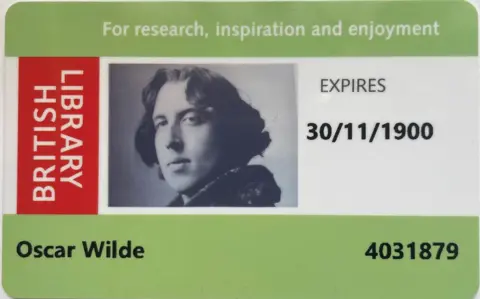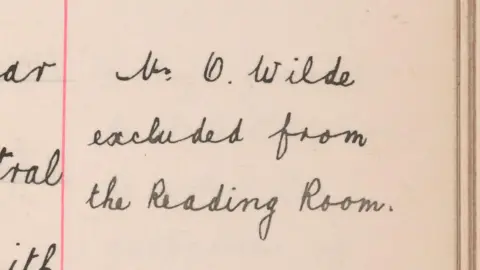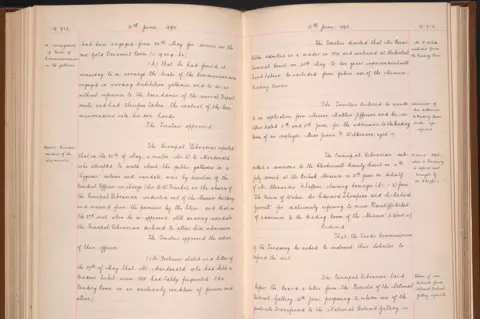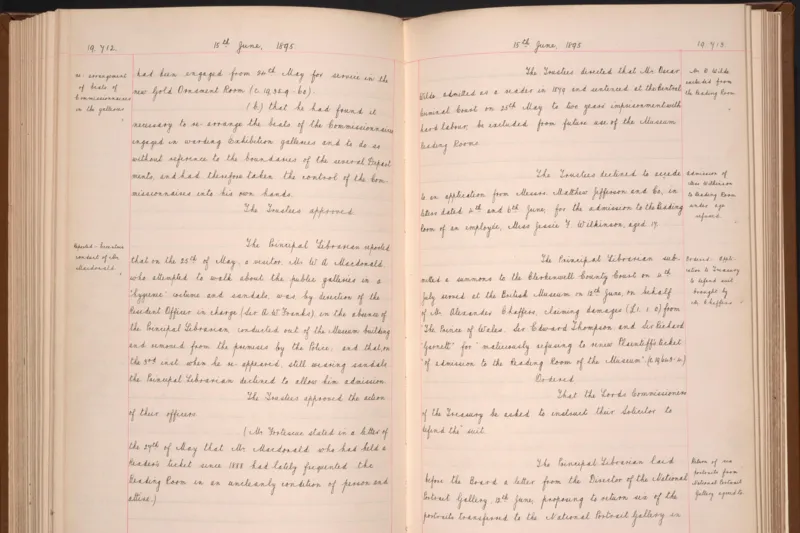Paul GlynnCulture reporter
 British Library Board
British Library BoardThe British Library has honoured late Irish writer Oscar Wilde by reissuing a reader’s card in his name, 130 years after his original was revoked following his conviction for “gross indecency”.
The celebrated novelist, poet and playwright was excluded from the library’s reading room in 1895 over his charge for having had homosexual relationships, which was a criminal offence at the time.
The new card, which will be collected by his grandson, author Merlin Holland, on Thursday, is intended to “acknowledge the injustices and immense suffering” Wilde faced, the library said.
Mr Holland said the new card is a “lovely gesture of forgiveness and I’m sure his spirit will be touched and delighted”.
 The British Library
The British LibraryThe decision to revoke Wilde’s pass for the library – then the British Museum reading room – was recorded without comment in the trustees’ minutes for 15 June 1895.
He had been in prison for three weeks at the time after being handed a two-year prison sentence with hard labour.
The author was convicted after he lost a libel trial against Lord Queensberry, who had accused him of being homosexual after discovering that his son, Lord Alfred Douglas, aka Bosie, was Wilde’s lover.
The library regulations at the time said anyone convicted of a crime should have their card revoked.
‘Letter from prison meant so much’
The British Library holds handwritten drafts of some of Wilde’s most famous plays including The Importance of Being Ernest, An Ideal Husband, A Woman of No Importance and Lady Windermere’s Fan.
Its collection also includes De Profundis, the letter he wrote to Bosie from Reading Gaol.
Mr Holland, the only living descendant of Wilde, will collect the new card at a ceremony at the venue on what would have been his grandfather’s 171st birthday.
Speaking to BBC Radio 4’s Today programme on Thursday, Mr Holland said he felt both “proud” of his grandfather and slightly burderened by the responsibility of handling his legacy.
“People will so often write in to me and say, ‘I cannot tell you how much your grandfather’s De Profundis meant to me’,” he explained.
“It has a note of positivity at the end… he’s going to come out of prison and do something again.
“And people have written to me saying, ‘In a moment of terrible depression about my own life I read De Profundis, and I just wanted you to know that your grandfather’s letter from prison meant so much to me’.”
 British Library
British LibraryDame Carol Black, chair of the British Library, described Wilde as “one of the most significant literary figures of the nineteenth century”.
She said that by reissuing his library card, “we hope to not only honour Wilde’s memory but also acknowledge the injustices and immense suffering he faced as a result of his conviction”.
She added that they were “delighted” to welcome his grandson – who is the author of a new book, After Oscar: The Legacy of a Scandal – to receive the library card on his behalf.




